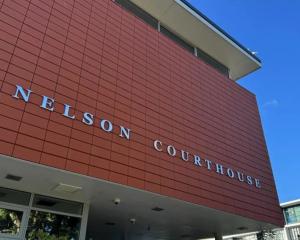
In the High Court at Auckland, Carla Dixon-Foxley described how Dixon was subjected to years of physical and emotional abuse by their mother Belle .
Dixon, 40, faces eight charges relating to incidents that occurred in January 2003 when Renee Gunbie and Simonne Butler were attacked with a samurai sword at Pipiroa near Thames and James Te Aute was shot dead in Auckland.
Dixon was found guilty in 2005 of eight charges, including murder and causing grievous bodily harm but the Court of Appeal later ordered a second trial, suppressing its reasons for quashing the earlier verdicts.
Ms Dixon-Foxley, 49, a nutritionist based in London, broke down as she first took the stand, apologising to Justice Hugh Williams saying she had been denied permission to visit with Dixon at court.
Dixon cried in the dock as he looked at his sister and spent much of her testimony with his head bowed.
Ms Dixon-Foxley said their mother, who gave birth to Dixon at the age of 47, was both verbally and physically abusive.
She was a devout member of the Jehovah's Witness church, quoting biblical verse often.
"She was always calling Tony the spawn of the devil, the rod of the devil," she said.
Her brother received the worst of their mother's punishment, she said.
"Because he was much younger, he got the full swing of it."
Their father had left home and Dixon was left at home alone to deal with their mother, she said.
Dixon was chained up outside to the clothes line "like a dog," Ms Dixon-Foxley said.
Their mother would call "the brothers" of the church around to beat him, she said.
"The brothers would come and administer punishments on him."
Mrs Dixon took in boarders, many of whom had mental issues.
"It was like living in a madhouse."
Ms Dixon-Foxley also outlined the sexual abuse Dixon suffered, including being forced to take part in pornographic movies and photo shoots by a friend of the family, who had since stood trial and been found guilty.
Under cross-examination, Ms Dixon-Foxley said due to their mother's religious views there was a lot of talk in their home about demons, Judas, being possessed by the devil and the "chosen ones".
Dixon liked being the centre of attention and "in command" and in hindsight had probably had attention deficit disorder as a child, she said.
As she finished her evidence, Justice Hugh Williams told Ms Dixon-Foxley it had not been his decision, or anyone else's in the court, to deny her access to her brother today.
As Ms Dixon-Foxley left the witness stand she smiled at her brother and they both began to cry, leading to an emotional hug between the pair as Dixon sat in the dock flanked by two security guards, before she left.
Defence psychiatrist Dr Justin Barry-Walsh told the court in the two assessments he had with Dixon in 2005 he had some abnormality of his mental state.
Dixon spoke of wanting to kill himself and others and while having "flashes of humour" in their first meeting, had a preoccupation he was the centre of a conspiracy.
Dixon was also preoccupied with religious themes, he said.
Dixon spoke of talking with God, having special powers and seeing images such as vampires, he said.
When challenged "he appeared to hold the beliefs with great conviction and stood by them".
The trial continues tomorrow.












